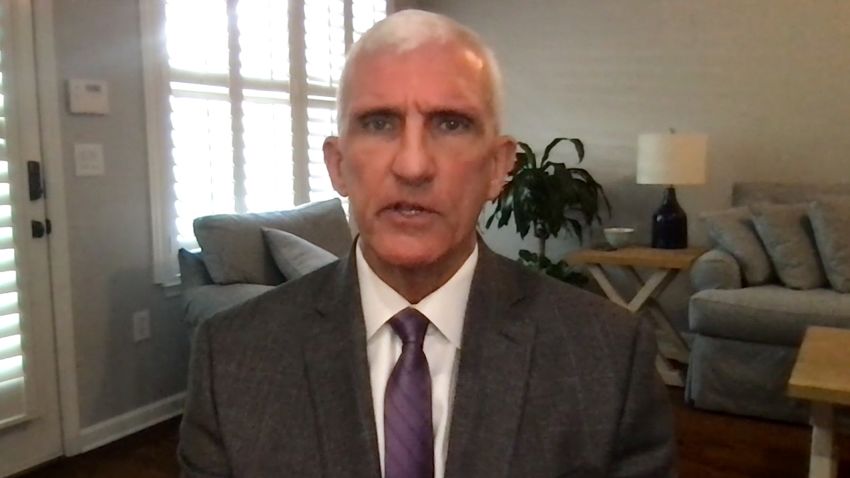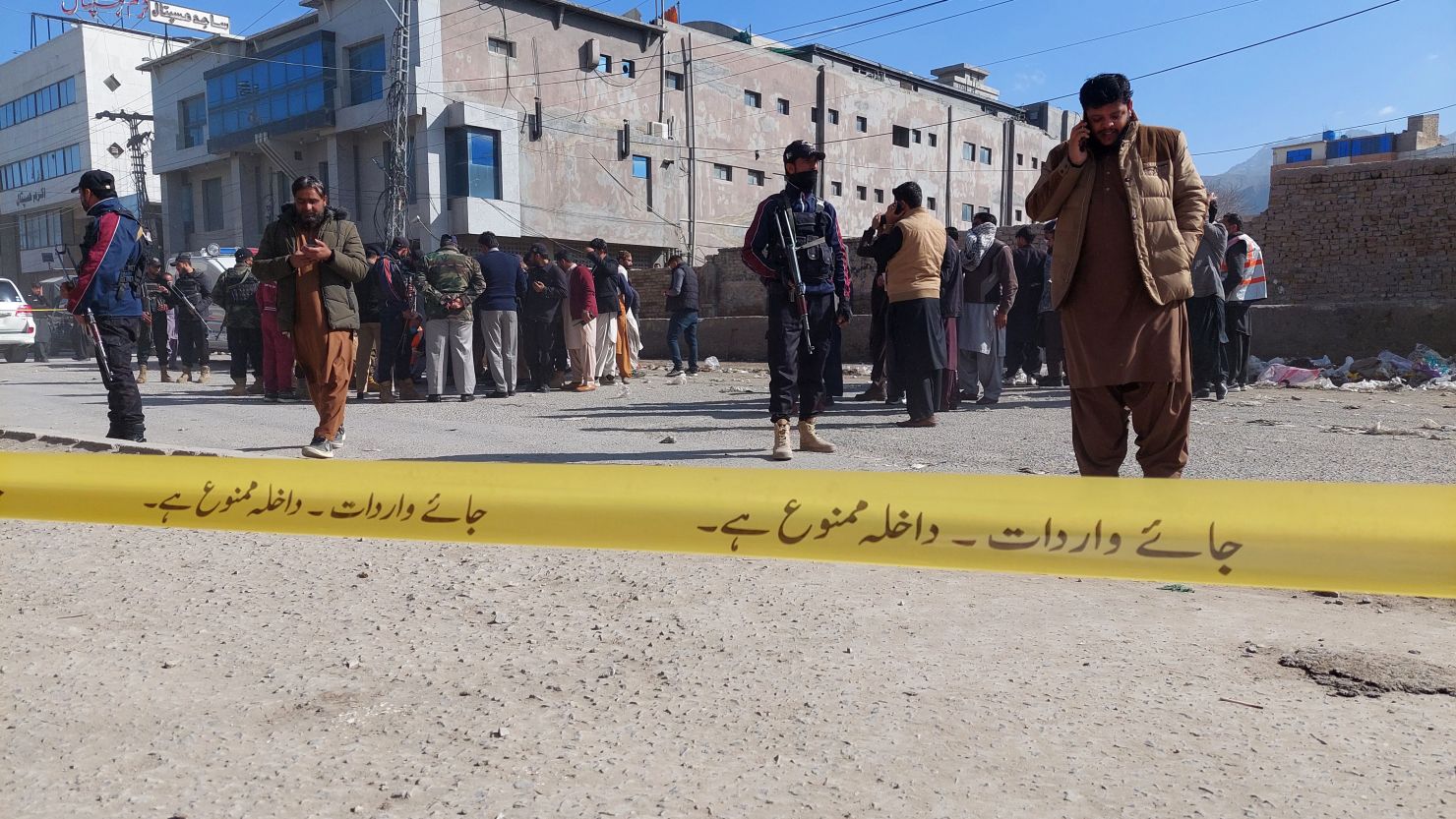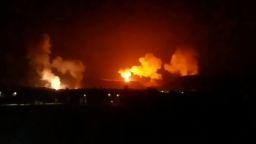Pakistan and Iran have both conducted strikes on each other’s territories in an unprecedented escalation of hostilities between the neighbors, at a time when tensions have risen sharply across the Middle East and beyond.
The two countries share a volatile border, stretching about 900 kilometers (560 miles), with Pakistan’s Balochistan province on one side and Iran’s Sistan and Baluchestan province on the other.
Both nations have long fought militants in the restive Baloch region along the border. But while the two countries share a common separatist enemy, it is highly unusual for either side to attack militants on each other’s soil.
The latest strikes come as Iran’s allies and proxies in the Middle East – the so-called axis of resistance – launch attacks on Israeli forces and its allies against the backdrop of the war in Gaza.
Here’s what you need to know.
What happened?
The opening salvo in this fast-moving sequence of events began Tuesday when Iran conducted strikes on Pakistan’s Balochistan province – killing two children and wounding several others, according to Pakistani authorities.
Iran claimed it had “only targeted Iranian terrorists on the soil of Pakistan” and that no Pakistani nationals were targeted.
But the attack sparked anger in Pakistan, which called the strike “an egregious violation of international law and the spirit of bilateral relations between Pakistan and Iran.”
Iran’s state-aligned Tasnim news agency said it had been targeting strongholds of the Sunni militant group Jaish al-Adl, known in Iran as Jaish al-Dhulm, or Army of Justice.
The separatist militant group operates on both sides of the Iran-Pakistan border and has previously claimed responsibility for attacks against Iranian targets. Its ultimate goal is independence for Iran’s Sistan and Baluchestan province.
Nuclear-armed Pakistan is majority Sunni – the dominant branch of Islam – while Iran and its “axis of resistance” is largely Shia.
Pakistan struck back two days later with what it called a “series of highly coordinated and specifically targeted precision military strikes” on several alleged separatist hideouts in Sistan and Baluchestan.
Announcing the strikes on Thursday, Pakistan’s Foreign Ministry said a number of militants were killed. At least 10 people — all Pakistani nationals — were killed, Tasnim reported, citing the deputy governor of Sistan and Baluchestan, who said authorities were investigating how those people had “settled in the village.”
Pakistan said it had for years complained that separatist fighters had “safe havens and sanctuaries” in Iran – and was forced to take matters into its own hands with Thursday’s strikes.
Why now?
Pakistan and Iran’s struggle against separatists operating on either side of each other’s borders is not new.
Deadly clashes along the turbulent border have happened regularly over the years. Just last month, Iran accused Jaish al-Adl militants of storming a police station in Sistan and Baluchestan, which resulted in the deaths of 11 Iranian police officers, according to Tasnim.
What is highly unusual, however, is each side’s willingness to hit targets across those borders, without informing each other first. And all this is happening against the backdrop of Israel’s bombardment of Gaza, which has sent repercussions coursing through the region.
The larger regional conflict may have emboldened Iran to be more proactive in pursuing targets beyond its borders, experts say – especially as the United States walks a tightrope between de-escalating hostilities and flexing its own military might to deter further moves by Iran.
The day before the strikes in Pakistan, Iran launched ballistic missiles at Iraq and Syria, claiming to be targeting a spy base for Israeli forces and “anti-Iran terror groups.”
Meanwhile, heavy fighting continues between Israel and the powerful Iran-backed group Hezbollah across the Lebanon border; and the US is fighting Iran-backed Houthi rebels in Yemen, who have attacked ships in the Red Sea in the name of revenge for Israel’s assault on Gaza.
“If you don’t censure Iran and its proxies … then there’s no cost for them to continue to pursue those activities,” said Karim Sadjadpour, Senior Fellow at the Carnegie Endowment for International Peace.
He added that Iran’s dominant position in the Middle East, in contrast to conflict-ridden nations like Yemen and Syria, means it stands to gain from regional instability and “filling power vacuums.” And Iran’s activities now serve to further several of its main goals, which include empowering Palestinians and counteracting American influence in the Middle East, he said.
Retired US Army Gen. Wesley Clark, a former NATO supreme allied commander, said the various hostilities reflect Iran “striving to cement its role as a leader in the region.”
“It’s seeking regional hegemony,” he told CNN. “And when the United States and Israel are there, and Israel’s waging this campaign against Hamas, then Iran feels the need to strike back and assert itself.”
What’s with the border conflict?
The Baloch people, also spelled Baluch, live where Pakistan, Afghanistan and Iran meet. They have long exhibited a fiercely independent streak and always resented being ruled by both Islamabad and Tehran, with insurgencies bubbling across the porous border region for decades.
The area they live in is also rich in natural resources, but Baloch separatists complain that their people, some of the region’s poorest, have seen little wealth trickle down to their communities.
Balochistan, Pakistan’s largest province by area, has witnessed a spate of deadly attacks in recent years, fueled by a decades-long insurgency by separatists who demand independence from the country, angered by what they say is the state’s monopoly and exploitation of the region’s mineral resources.
Iran has also faced a long history of insurgencies from its Kurdish, Arab and Baloch minorities.
Jaish al-Adl is just one of many separatist groups operating within Iran. It was originally part of a larger Sunni militant group called Jundallah, which fractured after its leader was executed by Iran in 2010, according to the US government’s National Counterterrorism Center. Jaish al-Adl emerged instead and has been designated a foreign terrorist organization by the US State Department.
The group often targets Iranian security personnel, government officials, and Shia civilians, according to the National Counterterrorism Center.
In 2015, the group claimed responsibility for an attack that killed eight Iranian border guards, with militants reportedly crossing into Iran from Pakistan. And in 2019, it claimed responsibility for a suicide bombing that hit a bus carrying members of the Iranian military, killing at least 23 in Sistan-Baluchestan.
On Wednesday, a day after Iran’s strikes on Pakistan, Jaish al-Adl claimed responsibility for an attack on an Iranian military vehicle in Sistan and Baluchestan.

What’s next?
Iran’s strikes on Tuesday sparked a diplomatic spat, with Pakistan recalling its ambassador from Iran and suspending all high-level visits from its neighbor.
And after Pakistan’s strikes, Iran on Thursday demanded “an immediate explanation” from its neighbor, Tasnim reported – and the Iranian military conducted a large-scale exercise off the country’s southwest coast, involving the air force, naval forces and ground forces.
Nearby nations have weighed in, with Turkey’s foreign minister holding calls with his counterparts in both Iran and Pakistan. Afterward, he said neither country wanted to escalate tensions further.
India said it has “zero tolerance towards terrorism,” and that the attack was “a matter between Iran and Pakistan.” China urged both nations to exercise restraint, and the European Union said it was “gravely concerned by the spiral of violence in the Middle East and beyond.”
US State Department spokesperson Matt Miller also urged restraint on Thursday – but added he didn’t think the flare-up was “in any way, shape or form connected to Gaza.”
“But whenever you see things, see strikes in the region, given the tensions in the region, there is the risk for increase in conflict, which is something that we’re trying to avoid,” he said.
It is not clear whether either Iran or Pakistan would want to descend into full-blown hostilities over separatist groups that they both regard as an enemy.
Both sides issued statements after their respective strikes that hinted at a desire not to see things escalate.
Pakistan’s Foreign Ministry called Iran a “brotherly country” and emphasized the need to “find joint solutions.”
That echoed the Iranian foreign minister, who called Pakistan a “friendly country” earlier this week and said their strikes were proportionate and only aimed at militants.



